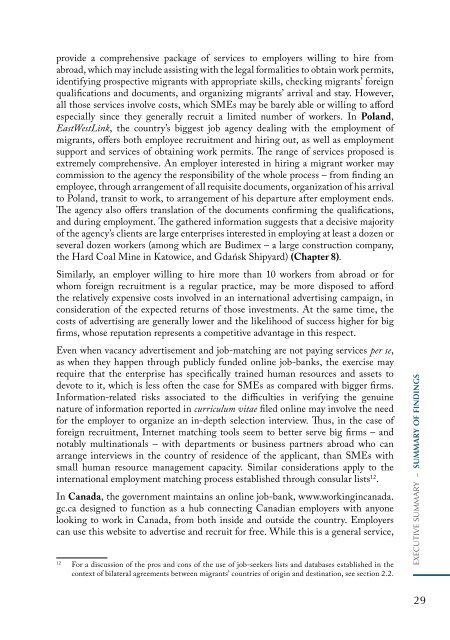International Organization for Migration (IOM)
International Organization for Migration (IOM)
International Organization for Migration (IOM)
You also want an ePaper? Increase the reach of your titles
YUMPU automatically turns print PDFs into web optimized ePapers that Google loves.
provide a comprehensive package of services to employers willing to hire from<br />
abroad, which may include assisting with the legal <strong>for</strong>malities to obtain work permits,<br />
identifying prospective migrants with appropriate skills, checking migrants’ <strong>for</strong>eign<br />
qualifications and documents, and organizing migrants’ arrival and stay. However,<br />
all those services involve costs, which SMEs may be barely able or willing to af<strong>for</strong>d<br />
especially since they generally recruit a limited number of workers. In Poland,<br />
EastWestLink, the country’s biggest job agency dealing with the employment of<br />
migrants, offers both employee recruitment and hiring out, as well as employment<br />
support and services of obtaining work permits. The range of services proposed is<br />
extremely comprehensive. An employer interested in hiring a migrant worker may<br />
commission to the agency the responsibility of the whole process – from finding an<br />
employee, through arrangement of all requisite documents, organization of his arrival<br />
to Poland, transit to work, to arrangement of his departure after employment ends.<br />
The agency also offers translation of the documents confirming the qualifications,<br />
and during employment. The gathered in<strong>for</strong>mation suggests that a decisive majority<br />
of the agency’s clients are large enterprises interested in employing at least a dozen or<br />
several dozen workers (among which are Budimex – a large construction company,<br />
the Hard Coal Mine in Katowice, and Gdańsk Shipyard) (Chapter 8).<br />
Similarly, an employer willing to hire more than 10 workers from abroad or <strong>for</strong><br />
whom <strong>for</strong>eign recruitment is a regular practice, may be more disposed to af<strong>for</strong>d<br />
the relatively expensive costs involved in an international advertising campaign, in<br />
consideration of the expected returns of those investments. At the same time, the<br />
costs of advertising are generally lower and the likelihood of success higher <strong>for</strong> big<br />
firms, whose reputation represents a competitive advantage in this respect.<br />
Even when vacancy advertisement and job-matching are not paying services per se,<br />
as when they happen through publicly funded online job-banks, the exercise may<br />
require that the enterprise has specifically trained human resources and assets to<br />
devote to it, which is less often the case <strong>for</strong> SMEs as compared with bigger firms.<br />
In<strong>for</strong>mation-related risks associated to the difficulties in verifying the genuine<br />
nature of in<strong>for</strong>mation reported in curriculum vitae filed online may involve the need<br />
<strong>for</strong> the employer to organize an in-depth selection interview. Thus, in the case of<br />
<strong>for</strong>eign recruitment, Internet matching tools seem to better serve big firms – and<br />
notably multinationals – with departments or business partners abroad who can<br />
arrange interviews in the country of residence of the applicant, than SMEs with<br />
small human resource management capacity. Similar considerations apply to the<br />
international employment matching process established through consular lists12 .<br />
In Canada, the government maintains an online job-bank, www.workingincanada.<br />
gc.ca designed to function as a hub connecting Canadian employers with anyone<br />
looking to work in Canada, from both inside and outside the country. Employers<br />
can use this website to advertise and recruit <strong>for</strong> free. While this is a general service,<br />
12 For a discussion of the pros and cons of the use of job-seekers lists and databases established in the<br />
context of bilateral agreements between migrants’ countries of origin and destination, see section 2.2.<br />
eXecutIve summAry – SUMMARY OF FINDINGS<br />
29


